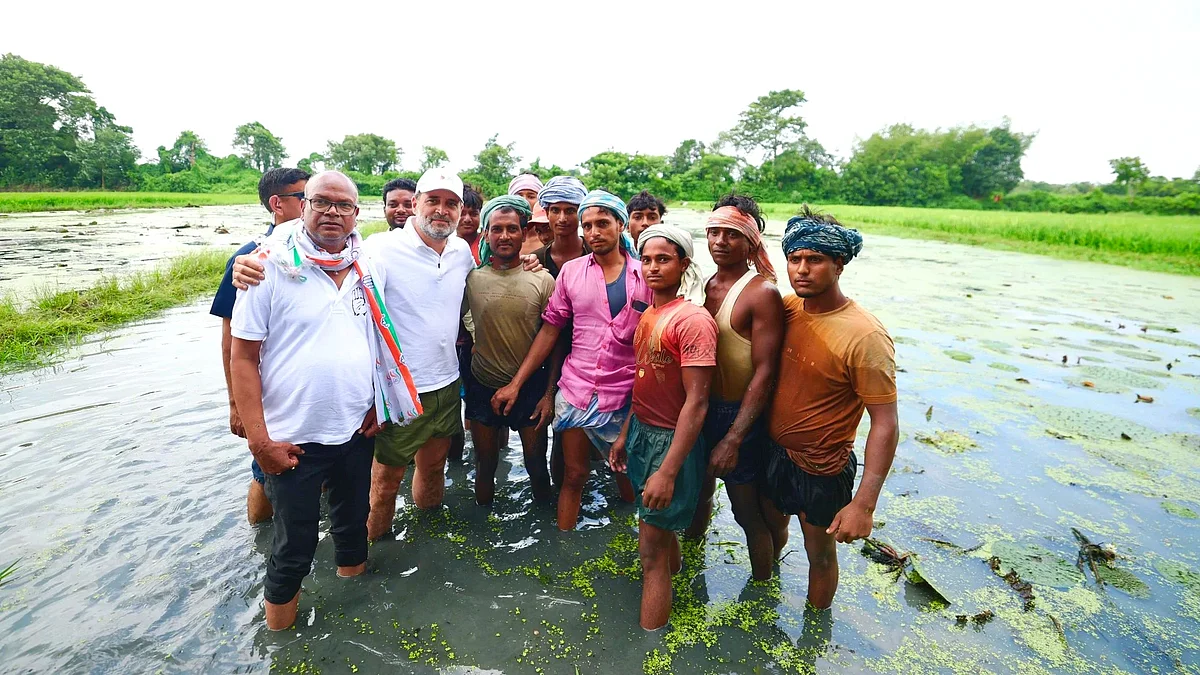Minting makhana: Rahul Gandhi flags superhuman effort behind superfood
Lok Sabha LoP meets makhana farmers on Bihar Voter Adhikar Yatra, points to their meagre earnings despite high price of their crop

Today, August 25, in a seven-minute video posted on X, Congress MP and Lok Sabha Leader of Opposition Rahul Gandhi was seen touring Bihar’s rural hinterland, interacting with makhana cultivators who talked about the laborious process of cultivating makhanas or fox nuts — a superfood crop that has recently earned Bihar a geographical indicator (GI) tag.
The visit was one of the highlights so far of the Bihar Voter Adhikar Yatra, a campaign by the Congress and RJD (Rashtriya Janata Dal) against the hugely controversial special intensive revision (SIR) of the state's electoral rolls, which has resulted in roughly 65 lakh people being struck off the list of voters.
Speaking to the Congress leader, farmers in Bihar’s Katihar district shared several issues that keep them from earning respectable profits, such as lack of market linkages, intensive labour bereft of mechanisation, stocking capacity and affordable credit facilities.
“All these issues result in big traders and merchants profiting from our hard work while we end up doing this daily drudgery,” a disheartened 20-year-old makhana processing unit worker told Gandhi.
Gandhi was seen entering the shallow ponds where makhanas lay submerged in water encased in a black shell. From there, he traced its journey to the finished product, which entailed harvesting, drying, roasting and packaging.
Gandhi was accompanied by Bihar Congress chief Rajesh Kumar and RJD leader and former Bihar deputy chief minister Tejashwi Yadav on his visit to the makhana processing unit.
Intrigued by the intensive labour and hazardous conditions in which makhana is cultivated and processed, Gandhi repeatedly enquired whether these processes could be mechanised, but the actual harvesting can apparently only be done by hand, while workers at the processing unit told him they had no access to makhana popping machines which would not only make their lives easier, but also ensure greater output.
At a cost of anywhere between Rs 7 lakh and 15 lakh, these machines would be out of reach for most units anyway.
In the absence of mechanisation, workers often suffer injuries including cuts and burns as they process the makhana, as Gandhi's video showed.
In his video post in Hindi, Gandhi wrote: 'Your 'superfood' makhana — have you ever thought about where it comes from? Who makes it, and how? Makhana is the product of the blood and sweat of Bihar's farmers — sales in thousands, but income in pennies — the entire profit goes only to the middlemen. Our fight is against this very injustice — the reward for hard work and skill should go to the labourer alone.'
in a post accompanying the video on his YouTube channel, Gandhi wrote: 'Bihar grows 90 per cent of the world's makhana, but the farmers and labourers who work day and night in the sun and rain do not earn even 1 per cent of the profit. I met the farmers in their fields and got to know their ordeal."
Makhana sells for Rs 1,000-2,000 per kg in big cities, but the workers, the foundation of the entire industry, get a nominal price, Gandhi said. "Who are these farmers and labourers? Extremely backward, Dalit-Bahujans. The entire hard work is of these 99 per cent Bahujans and the benefit goes to only 1 per cent middlemen."
"The 'vote chor' government neither respects nor cares for them — neither gives them income, nor justice. The right to vote and the right to skill are two sides of the same coin — and we will not let them lose either of them," he said.
The theme of 'vote chori' or election fraud is one that Gandhi and Tejashwi have consistently driven home throughout the Voter Adhikar Yatra, claiming that the current NDA government at the Centre and Bihar have come to power on the strength of 'fake voters', in collusion with the Election Commission of India.
ICAR's efforts at mechanising makhana popping
Makhana is an aquatic plant seed predominantly cultivated in states such as Bihar, Assam, West Bengal, Tripura, and Odisha.
According to the Indian Council of Agricultural Research (ICAR), in Bihar alone, it is grown in approximately 15,000 hectares of water bodies. As per official estimates, around five lakh families are directly engaged in various stages of makhana production, including cultivation, harvesting, popping, and marketing. Each year, Bihar contributes an estimated 7,500 to 10,000 tonnes of popped makhana to the market.
As shown in Gandhi's video, the traditional popping process is laborious, time-consuming, and physically demanding. It involves a three-stage manual technique where seeds are roasted at high temperatures between 250°C and 320°C, using earthen pots or cast-iron pans.
The seeds are then tempered for two to three days, followed by another round of roasting, and finally popped manually with a mallet. This last step demands precision, as even a slight delay can compromise the quality of the final product.
To address these challenges, the ICAR-Central Institute of Post-Harvest Engineering and Technology (CIPHET), Ludhiana, has developed and commercialised a fully mechanised system for threshing, cleaning, grading, drying, roasting, and popping makhana.
The innovation reduces processing time from the traditional two-three days to just 20 hours. The resulting makhana is of higher quality and commands a better market price — typically at least Rs 50 per kg more than manually processed makhana.
As per notes on the official ICAR website, currently, two manufacturers produce the machine commercially, and it has been installed at 'five to six' locations across India.
Follow us on: Facebook, Twitter, Google News, Instagram
Join our official telegram channel (@nationalherald) and stay updated with the latest headlines
